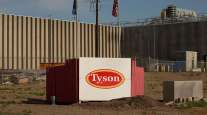Bloomberg News
White House Blasts Meatpackers for Grocery ‘Profiteering’

[Stay on top of transportation news: Get TTNews in your inbox.]
The Biden administration is taking aim at major meatpackers, charging that “pandemic profiteering” is squeezing consumers and farmers alike, with a few companies that dominate the industry raking in record profits.
White House National Economic Council Director Brian Deese said Sept. 8 that increases in the prices of beef, pork and poultry are responsible for half the jump in food prices since late 2020, yet farmers have seen little gain in what they are paid by giant meat companies.
“It raises a concern about pandemic profiteering, about companies that are driving price increases in a way that hurts consumers who are going to the grocery store,” Deese said. What’s happened “isn’t benefiting the actual producers, the farmers and the ranchers that are growing the product.”
The comments, at a press briefing at the White House, and in an earlier blog post by three senior Biden administration aides, sent shares in major meat companies down. Sanderson Farms Inc. dropped as much as 1.8%, while JBS SA’s American depositary receipts fell 4.8% and Tyson Foods Inc. slumped as much as 1.9%.
JBS USA Holdings is ranked No. 53 on the Transport Topics Top 100 list of largest private carriers in North America.
Tyson said it “categorically rejects” the conclusions. High meat prices were driven in part by unprecedented beef demand amid a global pandemic, according to a company statement.
Tyson Foods is ranked No. 8 on the Transport Topics Top 100 private list.
With midterm elections looming next year, the Biden administration has been showing concern about rising consumer prices as the economy rebounds from COVID-19. Republicans have repeatedly faulted President Joe Biden and Democrats, saying their economic policies have caused prices to rise. The White House says price pressures are temporary and the result of the rebound.

The White House blamed corporate consolidation in recent decades for the price increases. Four companies control 82% of U.S. beef capacity while the pork and poultry sectors have similar levels of concentration, according to U.S. Agriculture Department data.
“Absent this corporate consolidation, prices would be lower for consumers and fairer for farmers and ranchers,” Deese and two other economic advisers said in the blog post.
The briefing focused on measures that have already been announced, including Justice Department antitrust investigations initiated before Biden took office, new regulatory proposals intended to protect livestock producers and legislation to boost cattle-market transparency.

Fleet managers find that healthy, happy drivers are key to business success. Stephen Kane of Rolling Strong says driver health starts with “being vulnerable enough to listen to somebody that knows about health.” Hear a snippet above, and get the full program by going to RoadSigns.TTNews.com.
The briefing by senior White House officials and Agriculture Secretary Tom Vilsack signaled a political focus on the meatpacking industry, which suffered sustained public criticism after plants became early epicenters of the COVID-19 pandemic.
Tyson said it was inaccurate to blame high meat prices on industry consolidation. “We have seen a rise in availability and quality of beef, while the price has become more affordable over the past quarter century,” the company said. Other major meatpacking companies didn’t respond to requests for comment.
Mark Dopp, chief operating officer for the North American Meat Institute, an industry trade group, criticized the statements as “inflammatory” and blamed rising meat prices largely on “a persistent and widespread labor shortage.”
“Meat and poultry markets are competitive and dynamic with no one sector of the industry consistently dominating the market at the expense of another,” Dopp said.
The Justice Department is investigating big beef meatpacking companies to determine whether they are violating antitrust laws. The probe started in the last year of the Trump administration, and Biden’s administration is pushing forward, with plans to issue additional civil investigative demands, according to a person familiar with the matter.
Asked if the administration is weighing options to break up the companies, Vilsack said the focus is on supporting competitors to ease the impact of consolidation.
Meanwhile, the Justice Department is conducting a criminal investigation of price-fixing by chicken producers. That effort has led to criminal charges against companies and executives, including Pilgrim’s Pride Corp. and its former CEO. Tyson has said it’s cooperating.

Beef-packers have been earning record profits. Tyson, the largest U.S. meat company by sales, said its beef segment had a record profit margin of 16% during the first nine months of fiscal 2021.
More restaurants are reopening while sales to consumers cooking at home have remained elevated. Meanwhile, U.S. cattle supplies have been relatively abundant and meat plants have struggled to find enough workers to staff slaughterhouses — a bottleneck that critics say depresses cattle prices.
Want more news? Listen to today's daily briefing below or go here for more info:




